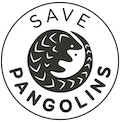Learning about Pangolins amidst COVID-19
Pangolins have received global attention with the news that the COVID-19 pandemic potentially came from pangolins in a Chinese wet market. Now, many people are learning about this little known creature for the first time and want to know more about pangolins and their connection to COVID-19. Below, we've compiled a list of FAQs from our community of supporters.
Q: Is it true that COVID-19 started with the consumption of a pangolin?
A: Recent research suggests pangolins were potentially an intermediary host that passed the virus to humans (possibly from bats), though it has yet to be proven. What is important to remember is that pangolins are harmless to people unless they are consumed/traded.
Q: What is a wet market?
A: A wet market is a marketplace where meat and produce is displayed and sold. Many wet markets sell live wild animals, which are sometimes slaughtered on-site for human consumption. They are known as “wet” because ice and water sprays, used to keep the goods fresh and to wash away blood, cause the market floors to be wet. These wet markets can be stocked through illegal poaching.
Q: How do wet markets contribute to disease transmission from animals to people?
A: Wet markets are often characterized by cramped conditions for animals in small cages, with cages often stacked on top of each other. This close proximity means that bodily fluids from the animals on top, such as blood, saliva, and excrement, will come in contact with the animals below them. This is how viruses spread between animal species in these environments. Insufficient sanitary conditions in the markets create perfect opportunities for zoonotic diseases to then spread from animals to humans. This is how scientists believe that COVID-19 spread from wild animals to people.
Q: What is a zoonotic disease, and what other infectious diseases can we get from wildlife?
A: A zoonotic disease is an infectious disease caused by bacteria, viruses, or parasites that spread from animals to humans. Some other examples of diseases that have been transmitted from animals to humans include SARS, a coronavirus pandemic that occurred in 2003, and MERS, another coronavirus outbreak that occurred in 2012. Ebola, HIV, and some strains of influenza also originated in wildlife before spreading to humans.
Q: Where are the primary places that pangolin consumption is happening?
A: Consumption of pangolins for their meat and scales has happened throughout Asia and Africa. In East Asia, most consumption happens in urban centers; in Africa, most occurs in Central and West Africa. In response to the COVID-19 crisis, China and Vietnam have recently announced new measures to ban aspects of the wildlife trade. Nigerian leaders are also working to raise awareness and protect pangolins within their borders. Click here for more information on pangolin trafficking between these countries.
Q: Are laws in China really changing? Will the outbreak of COVID-19 help pangolins?
A: Yes, laws are changing in China in the wake of COVID-19, which could have a significant and positive impact for the conservation of wildlife, if laws are enforced and consumer behavior change occurs. While China’s top legislature announced a significant ban on the trade and consumption of wild animals, and moved pangolins to the highest level of protection status, it is important to note that pangolins can still be traded for medicine, so further policy change is needed.
Q: What are the largest threats to pangolin populations?
A: Pangolins are threatened by overexploitation for local use of their meat and scales in Africa and Asia, and international trafficking to East Asia. Pangolin scales are used in traditional medicine on both continents, and their meat is considered a delicacy in parts of Asia. Other threats include habitat loss, due to expanding agriculture, and electrocution on electric fences set up by farmers.
Q: What do people that illegally buy pangolin scales do with the scales?
A: Pangolin scales are used as an ingredient in traditional medicines in China, Vietnam, other Asian countries, and parts of Sub-Saharan Africa. They are used to treat a variety of ailments, from arthritis to improving circulation. However, there are no scientifically proven benefits. Pangolin scales are made of keratin, the same protein that makes fingernails and hair.
Q: What’s the best thing we can do to help the preservation of these incredible creatures?
A: Spread the word, stay informed, do not eat pangolins or buy their scales, report wildlife crime, and make a donation to support conservation programs.





















